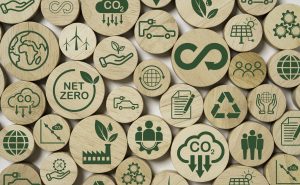By Kristin Naragon, Chief Strategy Officer at Akeneo
Ever noticed how our shopping habits have been shaped by years of clever marketing? We’ve been trained to chase deals, add extras for free shipping and indulge in free returns, often buying more than we need. This behaviour has led to mountains of waste and a hefty environmental footprint. But change is on the horizon.
Why now?
The World Wildlife Fund (WWF) has warned that if our consumption rates don’t change, we’ll need the equivalent of two planets to sustain us by the mid-2030s. And according to Annie Leonard’s documentary ‘The Story of Stuff’, only one per cent of “stuff” we buy is still in use six months after its purchase.This alarming statistic underscores the urgent need for a shift in our consumption patterns.
The movement towards change
There’s a growing movement of people and businesses pushing for more responsible consumption. Here are a few examples:
- Ad campaigns: Patagonia’s ‘Don’t Buy This Jacket’ campaign is a prime example. This bold move encouraged consumers to think twice before making unnecessary purchases, promoting sustainability over consumerism. More businesses are jumping on this trend, promoting less consumption and more sustainability.
- Buy Nothing Day: Started by Ted Dave in 1992, this anti-Black Friday movement now has millions participating worldwide to protest overconsumption. It’s gained so much momentum that even lawmakers in some European countries are considering banning Black Friday because it causes “resource waste” and “overconsumption.”
- Sharing economy: From $14 billion in 2014 to an expected $335 billion by 2025, the sharing economy is all about maximising the use of goods already in circulation. Services like Airbnb, Uber, and various peer-to-peer lending platforms exemplify this trend.
Shifts in buying behaviour
Consumers are getting smarter. Akeneo’s 2023 survey found that two-thirds of shoppers spend more time researching products now. They want to ensure what they buy meets their needs, reducing the need for returns. Plus, 76% of buyers feel good supporting companies addressing social and environmental issues. Our eco-conscious Gen Z and Millennial friends are 27% more likely to buy from brands that care about the planet.
The rise of minimalism
Minimalism is another significant trend. More people are prioritising experiences and relationships over material possessions, actively seeking to declutter their lives. According to a PwC survey, 69% of consumers plan to cut back on non-essential spending over the next six months, while 15% said they’re going to halt non-essential purchases altogether.
How companies are responding
With all this pressure, many companies are stepping up. Over 90% of S&P 500 companies now publish CSR (Corporate Social Responsibility) reports, up from just 20% a decade ago. And B Corps – businesses meeting high standards of social and environmental performance – are booming, with over 6,500 certified globally.

Government action
Governments are also listening. From mandating electric cars to introducing Right to Repair laws, they’re ensuring businesses can’t ignore these changes. In the EU, Digital Product Passports (DPPs) will soon require detailed transparency about products’ materials, sourcing and sustainability.
Adapting without complicating the customer experience
So, how can businesses adapt without complicating the customer experience (CX) and still achieve growth? Here are three simple steps:
- Set a product experience (PX) standard: Consider advanced Product Information Management (PIM) to build complete and engaging product experiences. For example, U.S. Electrical Services improved customer satisfaction and increased revenue by providing detailed product information, reducing returns.
- Participate in the sharing economy: Think outside the box – e.g., refurbish, rent, or sell pre-owned products. Solotech, for instance, found a new consumer market for its used professional-grade lighting and sound equipment.
- Empower your buyers with transparency: Highlight the eco-friendly aspects of your products and ensure detailed transparency. Pilot Pens did this by promoting products made from recycled materials, significantly boosting their sales.
Embrace the change
Embracing responsible consumption isn’t just good for the planet; it’s good for business too. Purpose-driven companies outperform their counterparts in productivity, retention, and growth. So, let’s join the revolution and build a future where transparency and sustainability guide our choices.
Conclusion
The tipping point into more responsible consumption is closer than ever before. As Kristin Naragon, Chief Strategy Officer at Akeneo, explains, any company can take relatively simple steps to accelerate this movement, win more business, and be on the right side of history. Over the last several decades, companies have focused on CX and in doing so have trained us to shop deals and indulge in impulsive buying, ultimately contributing to waste and environmental damage. But now, there is a groundswell movement to curb this reckless consumerism.
Final thoughts
Reflecting on the examples provided, it is clear that the systems in place compel us all to be irresponsible, but millions of people are trying to change their behaviours and even more meaningfully change the system so that we can all be more responsible. Ad campaigns like Patagonia’s, movements like Buy Nothing Day, and the burgeoning sharing economy highlight that the desire for change is widespread and growing. As consumer behaviour shifts towards supporting socially and environmentally responsible companies, and as governments implement stringent regulations, businesses must adapt to stay relevant and thrive in this new era of responsible consumption.
Joining the responsible consumption revolution means making informed, conscientious choices that benefit not only the planet but also future generations. By embracing transparency, sustainability, and the values of the sharing economy, businesses and consumers alike can contribute to a healthier, more sustainable world. Let’s take these steps together and be part of the solution, driving positive change for a better tomorrow.
Kristin champions responsible consumption and sustainability in business. Follow her for more insights on how to create a positive impact through informed and responsible business practices. Feel inspired? Share this post and let’s spread the word about the responsible consumption revolution.
Published 02/09/2024


